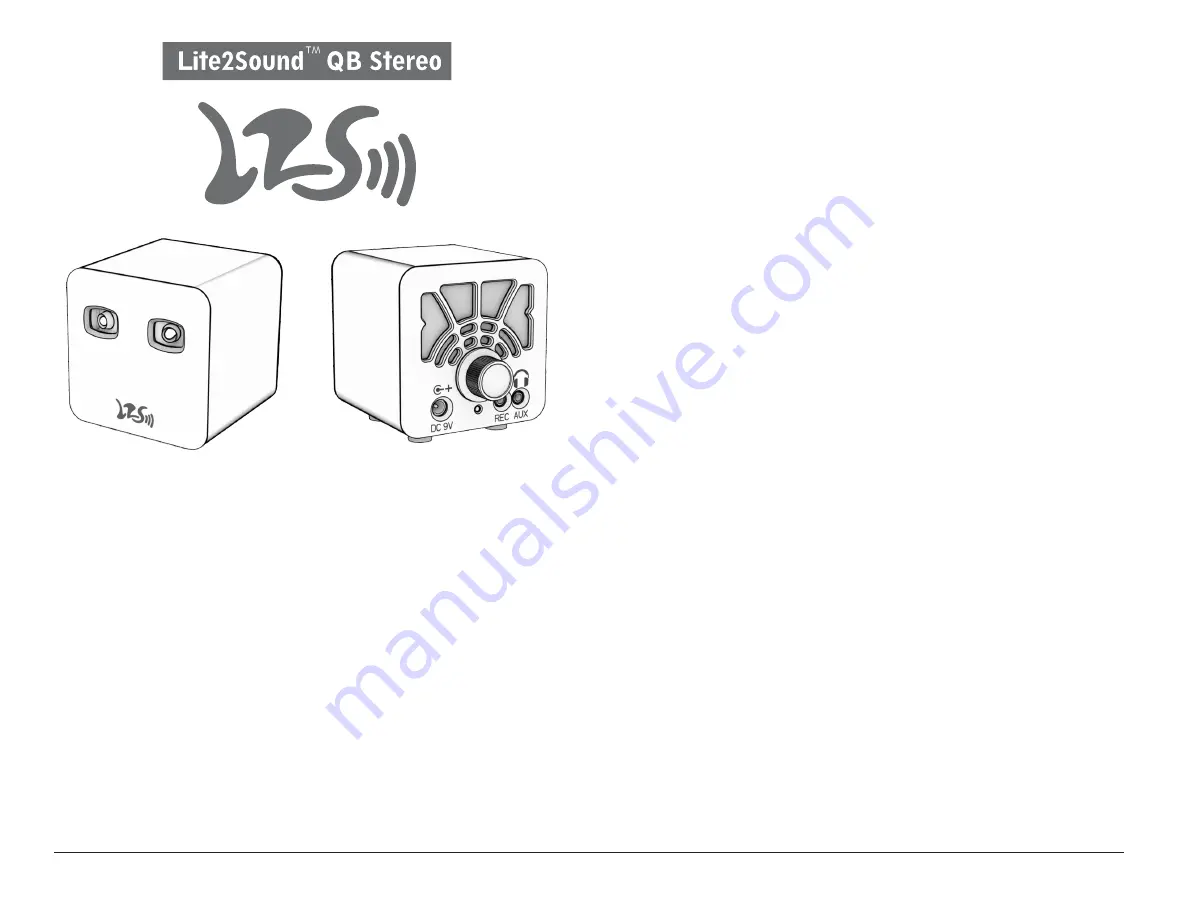
Lite2Sound QB Stereo | User Guide 1.2
Rare Waves LLC
rarewaves.net
This portable audio device is a 2-channel photodiode amplifier designed for
ambient listening. It picks up modulated light from your environment and converts
it directly to stereo analog audio.
Not a synthesizer or effects unit, it is more like a microphone or radio receiver. This
unit attempts to present you with a scientifically accurate version of what you could
perceive if your ears were sensitive to uctuations in light intensity. It does not
create sounds on its own, other than a residual amount of background noise due to
the high degree of amplification that is involved.
What your hear from it is entirely dependent on where you are, where the sensors
are pointed, what time of day it is, and whatever ambient light sources are present.
It can be used in a controlled recording environment with manipulated light
sources, generating sound samples for creative audio production. On the other
hand, we encourage you to bring it out of your studio and listen anywhere,
especially at night, and to make field recordings of the new sounds you discover. Or,
you can incorporate it into a performance or installation piece, but be mindful that
the results can be affected by the venue lighting and amount of daylight.
Does it only work at night?
It is best at night. But, even if there is bright light everywhere, you can still get
results by moving this unit closer to the source you want to hear.
In dim lighting and at night, this unit automatically boosts its gain, allowing
reception of modulated light from much farther away. From a distance, many
sources can blend together into a harmonic soundscape.
Does every light make a tone?
No. Only lights that are modulated, uctuating, or ickering rapidly can make
sounds. In many cases you will hear interesting sounds from lights that appear to
be steadily lit or changing slowly. On the other hand, you might initially expect to
hear colorful sounds from strings of holiday lights, but these often make a steady
hum.
Can invisible lights make sounds?
Yes, this unit is sensitive to near infrared (700 - 1100 nm), which is used in many
remote controls, IR data links, and IR motion detectors.
Is it normal to hear the AC mains hum?
Yes, most lamps or lights that are powered from the AC grid emit modulated light
containing steady humming sounds. This unit has enough fidelity to reveal
shades of tone from different lamps and light technologies, as well as uctuations
in the frequencies of the grid itself. In N. America, you will hear frequencies from
the harmonic series based on 60 Hz, while in Europe, the mains hum has a lower
pitch rooted at 50 Hz.
Sensor Side
Speaker Side
Do colors have different sounds?
It is possible, but it depends on the technology that is controlling the lights.
Lite2Sound QB Stereo’s sensors only respond to changes in brightness. For
example, a string of multicolored holiday lights emits the same tone from every
lamp, regardless of color, because they all share a common power source.
Can it pick up sounds from nature?
In special cases, yes. If the sun is high, and the atmosphere is very clear, you can
hear the sound of atmospheric turbulence. Or if sunlight reects off of a vibrating
object, it can carry the sound to you. And if a ray of sunlight is interrupted by rapid
motion like wing beats, it creates modulated light sounds, which you can hear with
this unit if its sensors are in the ideal position and angle. And naturally, lightning
ashes from electrical storms are revealed in detail.
Can I increase its range?
If you hold the sensor near the eyepiece of a binocular, it can gather signals from
much farther away.
In common settings, it often picks up humming sounds from room lighting. To
isolate a weaker source for better fidelity, move this unit closer to it, or turn off the
room lights.



